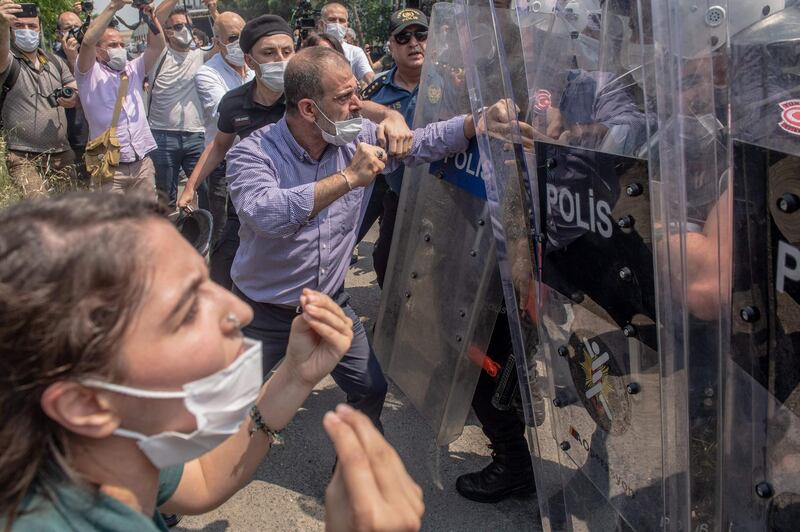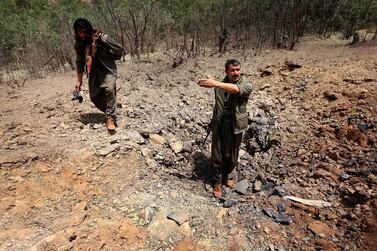Surrounded by a heavy cordon of riot police, members and supporters of Turkey’s third largest political party gathered at opposite ends of the country on Monday, preparing to march for democratic rights.
The routes from Edirne in the north-west and the south-eastern province of Hakkari were organised by the Peoples’ Democratic Party (HDP) after the arrest of three opposition MPs this month.
Some observers see the arrests as part of a renewed, post-Covid crackdown on Turkey’s opposition, particularly the HDP, which is rooted in Turkey’s Kurdish movement but has gathered support from left-wing voters in recent years.
“We are trying to strengthen democratic rights in Turkey,” Alp Altinors, a member of the HDP’s executive board, said from Hakkari.
“We know we have to win through a broad social movement because the AKP [ruling party] is accelerating and escalating political repression in the country, especially against our party.
“The action against the MPs is one of the latest manifestations of this repression.”
Two HDP deputies and an MP from the Republican People’s Party (CHP) were stripped of office as Parliament returned from a seven-week break because of coronavirus.
The HDP members had been convicted on terrorism charges while the CHP politician was found guilty of leaking state secrets.
On the same day their immunity was removed, Parliament, which is dominated by the Justice and Development Party (AKP) and its nationalist allies, also passed a law granting powers to a law enforcement body that the opposition says is being moulded into a pro-AKP force parallel to the police.
Critics say other worrying “post-Covid” developments include the arrests of dissenting journalists, signs of a clampdown on social media and proposed electoral changes that would disadvantage two new parties that have split from the AKP.
In Edirne, police arrested several marchers as they gathered outside the prison where former HDP leader Selahattin Demirtas has been held since November 2016.
Marchers aim to rally in Ankara at the end of the week.
Under the pretext of concern over the spread of the coronavirus, governors of several provinces along the routes banned demonstrations.
“When it comes to democratic demands, they try to hinder our party and use pandemic precautions for political reasons,” Mr Altinors said.
In 2015, the HDP became the first “Kurdish” party to enter Parliament. led by the charismatic Mr Demirtas, it passed Turkey’s 10 per cent electoral threshold.
The party’s success coincided with the AKP failing to achieve an overall majority in Parliament, leading it to seek nationalist support.
That summer also saw the collapse of peace talks with the Kurdistan Workers’ Party (PKK).
The government accuses the HDP of ties to the PKK, which has fought a 36-year insurgency against Turkey.
After a 2016 coup attempt, a wave of arrests led to thousands of HDP members being jailed, usually on allegations of supporting the PKK.
The government also began removing elected HDP officials, replacing them with their own appointments.
Following local elections last year in which the AKP lost in major cities thanks in part to informal agreements between the HDP and the CHP, dozens of HDP mayors were removed from their posts, leaving the party with only 12 of the 65 offices it won.
This led to domestic and international criticism that the government had usurped the popular vote in Kurdish-majority areas.
But President Recep Tayyip Erdogan vowed to go even harder on the party.
“Everything they do constitutes a crime,” Mr Erdogan said in February.
Mr Altinors said: “We are the third largest party in Turkey but they are trying to isolate and criminalise our party for our political stance.
“If you are an opposition party you are subject to many arbitrary measures.”
Selim Koru, an analyst at Tepav think tank in Ankara, said Mr Erdogan was trying to marginalise the HDP and divide the opposition.
“They have to be very careful,” Mr Koru said.
“There’s a backlash to being heavy-handed and interfering with elections and impairing the democratic process, and I think they’re aware this is a sensitive issue and they’re doing it very gradually.”
Meanwhile, growing nationalism was “suffocating” the HDP, Mr Koru said.
“It’s going to be very difficult for them to represent their views in their country.”







